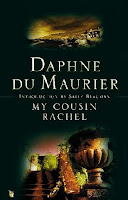Plot summary: Orphaned at an early age, Philip Ashley is raised by his benevolent older cousin, Ambrose. Resolutely single, Ambrose delights in Philip as his heir, a man who will love his grand home as much as he does himself. But the cosy world the two construct is shattered when Ambrose sets off on a trip to Florence. There he falls in love and marries - and there he dies suddenly.
Jealous of his marriage, racked by suspicion at the hints in Ambrose's letters, and grief-stricken by his death, Philip prepares to meet his cousin's widow with hatred in his heart. Despite himself, Philip is drawn to this beautiful, sophisticated, mysterious Rachel like a moth to the flame. And yet... might she have had a hand in Ambrose's death?
I've had My Cousin Rachel summed up to me by numerous friends as 'Like Rebecca, but not as good.' Luckily, it's been years since I've read Rebecca so I wasn't able to compare the two. Whilst I recognise that the tone and prose are very similar, I can't help thinking that My Cousin Rachel might actually be, you know... better?
I LOVED this book. I've heard complaints that it's very slow moving and I suppose it is, but it's almost purposeful. You can't pick up a du Maurier and expect constant action, violence and scenes of a sexual nature. It's slow, I suppose, but it has to be, and the pages flew past me regardless. The beauty lies in the gradual layering of information and context, each page adding a new shadow and new depth to your perception of the characters.
That's the key to My Cousin Rachel, the characters. Even more so than Rebecca, the plot relies completely on two people, Philip and Rachel. I have never seen such perfectly nuanced characters in the whole of fiction. I feel as if I have known these two people for always - I've been so engrossed in their world and in their minds that I swear I have relatives I don't know this well.
The importance is the interpretation, however. The most obvious question that arises throughout the book is 'Did Rachel kill her husband?' We know that, that's fine (although presumably not for Ambrose). But there are so many other questions as well - Is Philip a reliable narrator? Has he been swayed by his feelings? Was it Rachel's fault or unavoidable? Was the ending intentional? None of these questions are resolved by the narrative and they've been driving me mad ever since.
It could go so many different ways depending on your interpretation of the novel, and for this reason I think it might be more masterful even than Rebecca. I love that book, don't get me wrong, but it's pretty clear cut what happened by the end. Not so much here. I discussed it with the one other person I knew who had read it, and naturally she'd understood it completely differently to me (although this is the person with whom I nearly came to blows over We Need To Talk About Kevin) so we don't trust her view entirely ;)
One interpretation (which I admit didn't occur to me as I was reading) is that My Cousin Rachel is a feminist masterpiece, a pre-emptive strike against the sexist notion of friend-zoning. Rachel did nothing wrong - you only see her through the eyes of Philip, who comes to resent her beauty and charm, and her lack of willingness to marry him. I'm not so sure of this concept, but it highlights the many, many different lights in which this book can be viewed.
I do know that Philip Ashley needs a shake. He infuriated me. Don't get me wrong, he was perfectly crafted, but he was such a naive, wet, sulking little brat.I appreciated the masterful way in which he was written, but that appreciation didn't stop me from simultaneously wanting to throttle him.
Please read this. I don't care if you've read Rebecca or seen the Rachel Weisz film, or you're allergic to authors called Daphne. Go away and read this, and then come back immediately and talk to me about it.
What do you think? Was Rachel guilty?



No comments:
Post a Comment